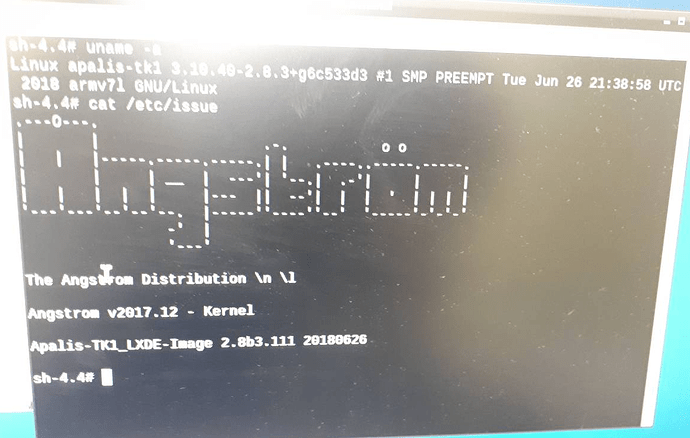I try to run example from (Getting Started Guide) for Apalis TK1 (Step 13), that demonstrates communication between two UART ports on evaluation board. I’ve comment lines, that transmit data from UART2 to UART3, and left lines only, that make “write” command from UART3 to UART2. Misunderstandings appears, when i want to read from UART2, in oscillogram i see transmit data from UART2 to UART3.
[upload|Ag19yq1WjbHNdP4yqWzVjrapAAQ=]
Blue - “Write” UART3 to UART2
Yellow - “Read” from UART2
Yellow cable - UART2_RXD to UART3_TXD
Blue cable just for oscillogram, left in air (UART2_TXD)
[upload|RTTdO0lOpz8iJfYvxaBrjEBEGSM=]
#include <stdio.h> /* I/O Definitions */
#include <unistd.h> /* Standard Symbolic Constants */
#include <fcntl.h> /* File Control Definitions */
#include <termios.h> /* POSIX Terminal Control Definitions */
#include <string.h> /* String Manipulation Definitions */
#include <errno.h> /* Error Code Definitions */
int main(int argc, char *argv[]) {
char buf_rx[16];
char buf_tx[16];
const char *first_uart = "/dev/ttyTHS1";
const char *second_uart = "/dev/ttyTHS2";
struct termios tty;
int fd_first_uart;
int fd_second_uart;
int flags = O_RDWR | O_NOCTTY ;//| O_NDELAY; /* O_RDWR Read/write access to the serial port */
/* O_NOCTTY No terminal will control the process */
/* O_NDELAY Use non-blocking I/O */
/*------------------------------- Opening the Serial Ports -------------------------------*/
fd_first_uart = open(first_uart, flags);
fd_second_uart = open(second_uart, flags);
if (fd_first_uart == -1 || fd_second_uart == -1) {
printf("\n Failed to open port! ");
return -1;
}
/*---------- Serial port settings using the termios structure --------- */
/* Settings (9600/8N1):
Baud rate: 9600 baud
Data bits: 8
Parity bit: No
Stop bit: 1
Hardware Flow Control: No
*/
tcgetattr(fd_first_uart, &tty); /* Get the current attributes of the first serial port */
cfsetispeed(&tty, B9600); /* Set read speed as 9600 baud */
cfsetospeed(&tty, B9600); /* Set write speed as 9600 baud */
tty.c_cflag &= ~PARENB; /* Disables the Parity Enable bit(PARENB) */
tty.c_cflag &= ~CSTOPB; /* Clear CSTOPB, configuring 1 stop bit */
tty.c_cflag &= ~CSIZE; /* Using mask to clear data size setting */
tty.c_cflag |= CS8; /* Set 8 data bits */
tty.c_cflag &= ~CRTSCTS; /* Disable Hardware Flow Control */
if ((tcsetattr(fd_first_uart, TCSANOW, &tty)) != 0) { /* Write the configuration to the termios structure*/
printf("\n Error! Can't set attributes.");
return -1;
} else {
printf("\n First UART all set! \n");Is
}
tcflush(fd_first_uart, TCIFLUSH);
tcgetattr(fd_second_uart, &tty); /* Get the current attributes of the second serial port */
cfsetispeed(&tty, B9600); /* Set read speed as 9600 baud */
cfsetospeed(&tty, B9600); /* Set write speed as 9600 baud */
tty.c_cflag &= ~PARENB; /* Disables the Parity Enable bit(PARENB) */
tty.c_cflag &= ~CSTOPB; /* Clear CSTOPB, configuring 1 stop bit */
tty.c_cflag &= ~CSIZE; /* Using mask to clear data size setting */
tty.c_cflag |= CS8; /* Set 8 data bits */
tty.c_cflag &= ~CRTSCTS; /* Disable Hardware Flow Control */
if ((tcsetattr(fd_second_uart, TCSANOW, &tty)) != 0) { /* Write the configuration to the termios structure*/
printf("\n Error! Can't set attributes.");
return -1;
} else {
printf("\n Second UART all set! \n");
}
tcflush(fd_second_uart, TCIFLUSH);
strncpy(buf_tx, "Second-to-First\r", sizeof(buf_tx));
int result = write(fd_second_uart, (char *) buf_tx, sizeof(buf_tx));
if (result == -1) {
printf("Error: %s\n", strerror(errno));
return -1;
} else {
printf("%d bytes sent to first UART\n", result);
}
printf("buf_tx1 = %s", buf_tx);
if (read(fd_first_uart, buf_rx, sizeof(buf_rx)) == -1) {
printf("Error: %s\n", strerror(errno));
return -1;
}
// else {
// printf("First UART received: %s\n", buf_rx); /* Print content read from serial */
// strncpy(buf_tx, "First-to-Second\r", sizeof(buf_tx));
// result = write(fd_first_uart, (char *) buf_tx, sizeof(buf_tx));
// if (result == -1) {
// printf("Error: %s\n", strerror(errno));
// return -1;
// } else {
// printf("%d bytes sent to second UART\n", result);
// }
// }
// printf("buf_tx2 = %s", buf_tx);
// if (read(fd_second_uart, buf_rx, sizeof(buf_rx)) == -1) {
// printf("Error: %s\n", strerror(errno));
// return -1;
// } else {
// printf("Second UART received: %s\n", buf_rx); /* Print content read from serial */
// }
close(fd_first_uart);
close(fd_second_uart);
return 0;
}
